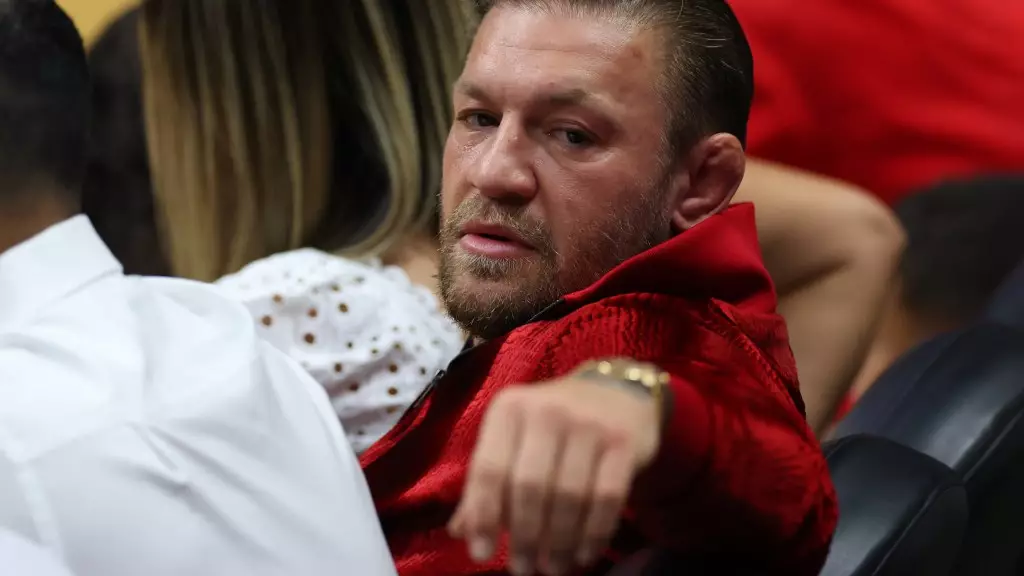In the realm of professional sports, controversies often transcend the arena, sometimes taking the form of legal battles that stir public sentiment. Conor McGregor, the notorious and charismatic figure in the UFC, finds himself once more at the center of a storm following a newly filed civil lawsuit for sexual misconduct. This time, the allegations are tied to a purported incident that occurred during a Miami Heat basketball game in 2023.
On Tuesday, a civil lawsuit was initiated in the United States District Court for the Southern District of Florida, asserting a claim of sexual battery against McGregor. The suit was presented by an anonymous plaintiff, referred to as “Jane Doe,” who reportedly seeks to preserve her identity to mitigate the potential fallout in her professional and personal life. At 49 years old, Doe holds the position of Senior Vice President at a prestigious financial institution on Wall Street, underscoring the grave implications this lawsuit could have on her reputation.
The lawsuit delineates a disturbing account of events purportedly occurring during the NBA Finals Game 4. Allegations state that McGregor’s security personnel forcibly escorted Doe to a bathroom where she asserts that McGregor attempted to commit sexual acts against her. These claims are severe and invoke critical questions about consent, safety, and the responsibilities of both the athletes and their entourages in high-stakes environments like professional sports events.
In light of these allegations, McGregor’s legal representative, Barbara Llanes, has expressed firm confidence in the dismissal of the case, arguing that a comprehensive investigation conducted at the time failed to discover sufficient evidence to support criminal charges. The state attorney’s office, as noted, opted not to pursue criminal prosecution, citing insufficient evidence and a lack of corroborating witnesses.
Llanes’ assertion that the plaintiff has concocted a “new false story” raises broader implications about the nature of such lawsuits in the world of high-profile sports figures. The tension between victim advocacy and the presumption of innocence becomes palpable in cases like this. While it is essential to listen to and support those who come forward with allegations, there remains the burden of proof that the legal system mandates in order to protect the rights of the accused.
The lawsuit does not solely target McGregor; it also implicates three co-defendants, including the entities responsible for operating the Kaseya Center and the Miami Heat, alleging gross negligence. This introduces an important discourse on the accountability of organizations in safeguarding public safety, particularly in environments that involve alcohol consumption and celebrity presence.
Jane Doe specifically contends that McGregor was not only allowed to remain in the venue post-incident but that employees continued to serve him alcoholic beverages, thereby exacerbating the situation. This raises critical questions about security protocols at sporting events and the responsibilities of those in charge. Should venues have stricter guidelines to monitor and manage the conduct of guests, particularly when they are public figures with a history of controversial behavior?
Past Allegations: A Pattern of Legal Challenges
This latest lawsuit against McGregor is not an isolated incident. The UFC star has previously faced legal scrutiny, including a verdict against him for sexual assault stemming from a case in Dublin in 2018. Despite his ongoing insistence on his innocence, these patterns paint a complex portrait of a man struggling against incessant allegations.
As McGregor continues to be embroiled in legal controversies, the implications for his career in the UFC grow uncertain. Since his last fight in mid-2021, a TKO loss to Dustin Poirier, McGregor’s presence in the octagon has been sorely missed but tainted by legal and personal dilemmas that overshadow his professional achievements.
As this legal battle unfolds, it serves as a crucial reminder of the intricate relationship between fame, personal conduct, and accountability. While McGregor remains an icon in the UFC, his repeated encounters with the law induce a broader reflection on the behaviors of public figures and their repercussions. The present allegation not only impacts McGregor but also ignites discourse around the broader societal implications of violence, privilege, and the support systems—or lack thereof—that exist at high-profile events. The outcome of this case could hold far-reaching consequences for all parties involved and instances of sexual misconduct in sports.

